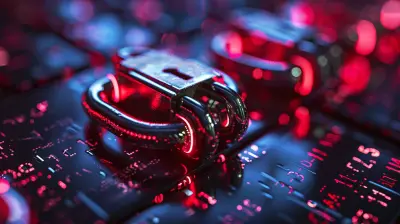How Blockchain Could Revolutionize Cybersecurity
20 February 2025
In today's interconnected world, where almost everything relies on digital systems, cybersecurity has become more important than ever. The internet, while revolutionary, has brought along a ton of vulnerabilities. From phishing scams to ransomware attacks, hackers have found countless ways to exploit weaknesses in our digital infrastructures. But what if there was a way to make our systems almost impenetrable? Enter blockchain technology.
Blockchain is often associated with cryptocurrencies like Bitcoin, but its potential goes far beyond digital coins. In fact, blockchain could be the game-changer we desperately need in the constantly evolving field of cybersecurity. But how exactly can blockchain revolutionize cybersecurity? Let's dive into this topic and explore the transformative power of blockchain in securing our digital world.

What Is Blockchain?
Before we get into the nitty-gritty of how blockchain could change cybersecurity, it’s crucial to understand what blockchain actually is. Think of blockchain as a digital ledger, but it’s not like any ordinary notebook. Instead, it’s a decentralized and distributed ledger that records transactions across many computers. This ensures that the data stored on the blockchain is secure, transparent, and immutable.Each "block" of information is connected to the previous one, creating a "chain" of blocks. Once data is recorded on the blockchain, it’s practically impossible to alter or delete it. This decentralized structure is what makes blockchain so unique compared to traditional databases that rely on a central authority or server.
Now, let’s go deeper into how blockchain’s distinctive features can be applied to cybersecurity.

The Current Cybersecurity Landscape
To appreciate how blockchain can help, we first need to understand the challenges we currently face in cybersecurity. Over the past few years, cybersecurity breaches have become more frequent and sophisticated. The traditional methods of protecting data — such as firewalls, antivirus software, and even two-factor authentication — are not always enough to keep hackers at bay.Here are a few common issues in today’s cybersecurity landscape:
1. Centralized Systems: Most of our current security systems are built on centralized frameworks. Whether it's a database or a cloud service, everything typically relies on one central authority or server. This makes it a prime target for hackers. If that central point is compromised, everything is at risk.
2. Data Integrity: Ensuring the integrity of data is one of the biggest challenges. Hackers can alter, delete, or manipulate data without leaving any trace, leading to massive security breaches.
3. Lack of Transparency: In centralized systems, transparency is often limited. It can be difficult to trace back the source of an attack or understand the full extent of a breach.
4. Human Errors: A large chunk of security breaches occur due to human mistakes—whether it's weak passwords, phishing attacks, or misconfigured systems. Humans are often the weakest link in the cybersecurity chain.
Blockchain, with its decentralized, immutable, and transparent nature, holds the potential to address these issues head-on.

How Blockchain Can Revolutionize Cybersecurity
Now that we have a sense of the current challenges, let’s look at how blockchain can flip the script and potentially revolutionize cybersecurity.1. Decentralized Security
One of the main reasons blockchain is so appealing for cybersecurity is its decentralized nature. Traditional systems rely on a single server or authority to manage and protect data. This creates a single point of failure. If that system gets hacked, then the entire network can be compromised.But blockchain doesn’t have a central point of vulnerability. Since the data on a blockchain is distributed across multiple nodes (computers), it’s incredibly difficult for hackers to take down the entire system. Even if one node is compromised, the rest of the network remains secure.
Imagine trying to break into a vault, but instead of there being one door, there are thousands, and all of them need to be opened simultaneously. That’s the level of security blockchain offers.
2. Enhanced Data Integrity
Data integrity means ensuring that information remains accurate and unchanged. One of blockchain’s superpowers is its immutability. Once data is added to the blockchain, it cannot be altered or deleted. Every transaction is recorded in a way that is permanent and verifiable.This is a huge advantage in cybersecurity. In traditional systems, hackers can often modify or erase data without detection. But on a blockchain, tampering with data is nearly impossible. If someone tries to alter the information, the entire network would know because the change wouldn’t match up with previous blocks in the chain.
In essence, blockchain acts as a permanent, indestructible record of events, making it an ideal solution for protecting sensitive data.
3. Transparency and Traceability
One of the most frustrating aspects of a cyberattack is not knowing where it came from or how it happened. In a traditional system, tracing the origin of a breach can be complicated and time-consuming.Blockchain, on the other hand, offers complete transparency. Every transaction or action taken on the blockchain is time-stamped and recorded for everyone to see. This means that if there’s ever a security issue, you can easily trace back to the source of the problem and understand exactly what happened.
This level of transparency makes it much harder for hackers to hide their tracks, and it provides a clear audit trail for security professionals.
4. Elimination of Passwords with Blockchain-Based Identity Verification
Let’s be honest—passwords are a pain. We’re all guilty of using the same password across multiple platforms, or worse, creating weak passwords like “123456.” Unfortunately, this makes it easier for hackers to break into our accounts.Blockchain has the potential to eliminate the need for passwords altogether. With blockchain-based identity verification, users could authenticate themselves without needing to rely on a password. Instead, a user’s identity could be linked to a unique blockchain ID, which is virtually impossible to forge or hack.
This would drastically reduce the risk of phishing attacks, brute force attacks, or any other password-based hacks. It’s like replacing a flimsy lock on your front door with an unbreakable, digital fortress.
5. Smart Contracts for Automated Security Protocols
Smart contracts are self-executing contracts where the terms are written into the code itself. They automatically enforce rules and execute actions when certain conditions are met.In cybersecurity, smart contracts could be used to automate and enforce security protocols. For example, if certain conditions in a system are met that indicate an attempted breach, a smart contract could automatically trigger a security response, such as locking down the system or alerting administrators.
This adds an extra layer of protection by allowing security protocols to be executed without human intervention, reducing the risk of human error.
6. Distributed Denial of Service (DDoS) Attack Prevention
DDoS attacks are one of the most common types of cyberattacks. In a DDoS attack, hackers flood a network or website with so much traffic that it becomes overloaded and crashes.Because blockchain is decentralized, it’s much harder to take down an entire network with a DDoS attack. Even if one part of the network is overwhelmed with traffic, the rest of the blockchain remains operational. This distributed nature makes it far more resilient to such attacks compared to traditional systems.
7. Securing the Internet of Things (IoT)
The Internet of Things (IoT) refers to the network of physical devices—like smart thermostats, cameras, and home assistants—that are connected to the internet. As more and more devices become interconnected, they also become prime targets for hackers.Blockchain could provide a solution to securing IoT devices. By using blockchain technology, IoT devices could communicate with each other in a secure, decentralized manner. Each device would have a unique identity on the blockchain, and any communication between devices would be verified and validated through the blockchain.
This would make it much harder for hackers to compromise IoT devices or use them to gain access to other systems.

Challenges of Implementing Blockchain in Cybersecurity
While blockchain has incredible potential to revolutionize cybersecurity, it’s important to acknowledge that it’s not a silver bullet. There are still challenges to overcome before blockchain becomes a widespread solution in this field.1. Scalability: One of the most significant challenges with blockchain is scalability. As more transactions are added to the blockchain, the network can become slower and more difficult to manage. This could be a potential bottleneck for large-scale cybersecurity applications.
2. Energy Consumption: Blockchain networks, particularly those using proof-of-work algorithms, require a massive amount of computational power and energy. This could be a concern when deploying blockchain for cybersecurity on a global scale.
3. Regulatory and Legal Issues: As with any emerging technology, there are regulatory and legal hurdles to overcome. Governments and organizations need to develop frameworks for how blockchain can be used in cybersecurity without violating privacy laws or other regulations.
Despite these challenges, the potential benefits of blockchain in cybersecurity are hard to ignore. With continued development and innovation, many of these issues may be resolved in the near future.
Conclusion
Blockchain is more than just a buzzword. It’s a groundbreaking technology that has the potential to reshape the way we approach cybersecurity. From decentralized security to eliminating passwords, blockchain offers innovative solutions that could make our digital world much safer.While we’re still in the early stages of fully realizing blockchain's potential in cybersecurity, one thing is clear: this technology has the power to revolutionize the way we protect our data, systems, and networks. As cyber threats continue to evolve, blockchain might just be the shield we need to defend against them.
all images in this post were generated using AI tools
Category:
Cyber ThreatsAuthor:

John Peterson
Discussion
rate this article
18 comments
Elowen Luna
Exciting insights! Blockchain's potential in cybersecurity is promising!
March 30, 2025 at 3:34 AM

John Peterson
Thank you! I'm glad you found the insights exciting—blockchain truly has the potential to transform cybersecurity.
Darby Gomez
Imagine a world where your data dances safely in a blockchain party—no unwanted guests allowed! Here’s how blockchain could turn cybersecurity into a tech fairy tale!
March 25, 2025 at 1:54 PM

John Peterson
Absolutely! Blockchain offers a secure, transparent way to protect data, ensuring it remains private and tamper-proof—truly a tech fairy tale for cybersecurity!
Betsy Harris
Blockchain's decentralized nature enhances data integrity and transparency, making it a powerful tool to combat cyber threats and identity theft.
March 22, 2025 at 7:19 PM

John Peterson
Absolutely! Blockchain's decentralization indeed strengthens data integrity and transparency, providing a robust defense against cyber threats and identity theft.
Maya Barker
Great insights! Blockchain's potential to enhance cybersecurity is truly transformative for the future.
March 21, 2025 at 9:16 PM

John Peterson
Thank you! I appreciate your feedback and completely agree—blockchain's capabilities could significantly strengthen cybersecurity measures.
Alexa Montgomery
Blockchain offers decentralized security, enhancing trust and resilience against cyber threats through transparency and immutability.
March 9, 2025 at 8:33 PM

John Peterson
Thank you for your insights! Indeed, decentralized security is a key advantage of blockchain, significantly boosting trust and resilience in cybersecurity.
Delia Bell
This article insightfully highlights the potential of blockchain technology in transforming cybersecurity. By decentralizing data storage and enhancing encryption, blockchain can significantly reduce vulnerabilities. It's exciting to see how this innovation might redefine security protocols in our increasingly digital world.
March 7, 2025 at 3:27 AM

John Peterson
Thank you for your insightful comment! I'm glad you found the article highlights on blockchain's potential in cybersecurity valuable. It's indeed an exciting frontier!
Isabelle Conrad
Blockchain in cybersecurity? Finally, a way to keep hackers as confused as my grandma trying to set up her email! Let’s hope it’s more effective than my last password.
March 5, 2025 at 9:35 PM

John Peterson
Thanks for your comment! Blockchain's potential in cybersecurity may indeed add a layer of complexity that could keep hackers at bay. Let's hope it proves as effective as we anticipate!
Honor Rocha
This article presents fascinating insights into the intersection of blockchain and cybersecurity! I'm intrigued by the potential for decentralized systems to enhance security and trust. It feels like we're on the brink of a new era in data protection. Can't wait to learn more!
March 5, 2025 at 4:12 AM

John Peterson
Thank you for your enthusiasm! I'm glad you found the insights intriguing—exciting times lie ahead in the world of blockchain and cybersecurity!
Rune Romero
Blockchain's decentralized nature uniquely positions it to enhance cybersecurity, fortifying systems against breaches and ensuring data integrity.
March 2, 2025 at 9:31 PM

John Peterson
Absolutely! Blockchain's decentralized architecture does provide significant advantages for enhancing cybersecurity, particularly in terms of data integrity and resilience against breaches.
Ivory McGuffey
Blockchain and cybersecurity—finally, a tech love story! It’s like a digital fortress that also knows how to dance. Imagine hackers trying to break in only to be blocked by a virtual bouncer saying, ‘Not today, friend!’ Let’s hope they don’t start mining for compliments instead!
March 2, 2025 at 12:08 PM

John Peterson
Glad you enjoyed the analogy! Blockchain's potential as a strong defense in cybersecurity is definitely worth celebrating. Let's keep the hackers at bay!
Marigold Gutierrez
This article presents a fascinating perspective on the intersection of blockchain and cybersecurity. I'm intrigued by the potential for decentralized solutions to enhance data integrity and security. It would be interesting to explore real-world applications and challenges in implementing this technology!
March 2, 2025 at 4:49 AM

John Peterson
Thank you for your insightful comment! I completely agree that exploring real-world applications and challenges is crucial in understanding the full potential of blockchain in enhancing cybersecurity.
Aiden Baker
In the realm where data flows, Blockchain emerges, a guardian rose. Decentralized trust weaves a secure embrace, A future where threats find no trace. Innovation blooms, cybersecurity reborn, In this dance, a new dawn is sworn.
March 1, 2025 at 11:45 AM

John Peterson
Thank you for your poetic insight! You've beautifully captured the transformative potential of blockchain in enhancing cybersecurity and building trust.
Brittany Harper
Promising potential, but challenges remain for blockchain in cybersecurity.
February 27, 2025 at 3:54 AM

John Peterson
Thank you for your insight! While challenges exist, the potential of blockchain to enhance transparency and security in cybersecurity is undeniable.
Journey Gomez
In a digital dance of trust and code, Blockchain emerges, a guardian bold. With each block, a promise, secure and bright, Transforming shadows into radiant light.
February 26, 2025 at 11:23 AM

John Peterson
Thank you for the poetic insight! Indeed, blockchain's innovative structure can significantly enhance cybersecurity by ensuring trust and transparency.
Lindsey McVeigh
This article brilliantly highlights the transformative potential of blockchain in enhancing cybersecurity! Its decentralized nature could indeed provide robust solutions to evolving threats. Excited to see how this technology reshapes our digital safety in the future!
February 25, 2025 at 12:23 PM

John Peterson
Thank you for your insightful comment! I'm glad you found the article engaging and share the excitement about blockchain's potential to enhance cybersecurity.
Regina McClain
Blockchain's decentralized nature offers a promising solution to enhance security and trust in data management.
February 24, 2025 at 1:37 PM

John Peterson
Thank you! Indeed, blockchain's decentralized architecture significantly strengthens security and fosters trust in data management by reducing single points of failure.
Reid McGhee
This article offers a compelling perspective on the intersection of blockchain technology and cybersecurity. It's inspiring to see innovative solutions that could enhance data integrity and user privacy. I look forward to seeing how these concepts evolve and their potential impact on the security landscape in the future.
February 23, 2025 at 3:53 AM

John Peterson
Thank you for your thoughtful comment! I'm glad you found the article inspiring and share your excitement about the future of blockchain in enhancing cybersecurity.
Cassian Franklin
Exciting possibilities ahead! Blockchain could truly enhance our cybersecurity landscape. Keep pushing forward!
February 22, 2025 at 1:57 PM

John Peterson
Thank you! I completely agree—blockchain holds great potential to transform cybersecurity. Let's continue exploring its possibilities!
MORE POSTS

How AI Chatbots are Enhancing Customer Support in Fintech

Wireless Charging: The Next Frontier in Battery Innovation

Exploring the Psychological Barriers to Autonomous Vehicle Adoption

The Impact of Wearable Tech on Personal Security and Privacy

The Role of Artificial Intelligence in Enhancing Robotic Process Automation

Wearable Payment Solutions: A Glimpse into the Cashless Future

How to Create a Minimalist Home Entertainment Setup

Ultrabooks with Stunning Displays for Movie Lovers

The Integration of AI in Future Healthcare Solutions

The Role of Ethical Hackers in Cyber Defense

Essential Tips for Creating a Family-Friendly Media Room